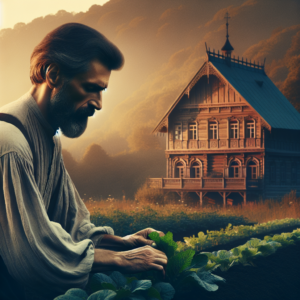Spiritual Devotional about Spiritual Ecology
Embracing Spiritual Ecology: A Divine Call to Stewardship
Hello beloved friends in faith,
Today, I want to invite you to embark on a journey that harmonizes your spirit with the earth itself. It’s an exploration into a profound and deeply interconnected relationship, a journey towards understanding and embracing what we call Spiritual Ecology.
The Symphony of Creation
As we wander through the pages of the Bible, one verse that stands out vibrantly is Genesis 1:31, "God saw all that He had made, and it was very good." This declaration is not just a verse to be read; it’s a divine proclamation that echoes through the valleys, over mountains, and within the hearts of all creation. It recognizes the inherent goodness and sanctity imbued in every element of the natural world.
Spiritual Ecology beckons us to see the Earth not merely as a resource, but as a sacred gift, a living testament to God’s boundless creativity and love. Each tree, each river, each breath of wind is a part of a divine tapestry woven by the Creator’s hand.
A Call to Guardianship
When God placed Adam in the Garden of Eden, He entrusted humanity with its care, as it is written in Genesis 2:15, "The Lord God took the man and put him in the Garden of Eden to work it and take care of it." This biblical principle underscores a divine mandate: we are stewards of this Earth. It’s not just an ancient duty but a living, breathing responsibility that persists today.
In spiritual ecology, we find that our spiritual health is intrinsically linked to the health of our environment. The way we nurture the soil, care for our waters, and protect the creatures of this world reflects our reverence for God’s creation. Just as our souls thrive on kindness and love, so too does our planet flourish under our compassionate stewardship.
Creation Speaks of God’s Glory
We see in Psalm 19:1, "The heavens declare the glory of God; the skies proclaim the work of his hands." Nature is a divine chorus proclaiming the glory and majesty of our Creator. Every sunrise and sunset, every blooming flower and whispering breeze is an invitation to open our eyes and hearts to the presence of God around us.
Imagine a life where we exhibit gratitude for the morning dew that nourishes the earth, the birds that herald the dawn with melody, and the rivers that sustain life. Our appreciation transforms everyday moments into spiritual experiences, reminding us of the interconnectedness of all creation with its Creator.
A Promise of Renewal
Let’s draw hope from the assurance found in Revelation 21:5, "He who was seated on the throne said, ‘I am making everything new!’" This promise of renewal isn’t just for humanity, but for all of God’s creation. We are invited to participate in this divine renewal, to be active agents of positive change and healing for our world.
Taking care of our environment is not a mere duty but a joyous and sacred act of worship. Recycling, conserving water, planting trees, and advocating for eco-friendly practices are not just good deeds but acts of gratitude and love towards our Creator and His creation.
A Community of Hope and Love
As an uplifting community of believers, we can inspire and support each other in this spiritual journey. Let’s share stories of how we’re living out our faith through caretaking the Earth, spread awareness about sustainable practices, and join forces in initiatives that protect and celebrate God’s creation.
Remember, every small step counts. Together, we can weave a new chapter in our faith story, one where love and reverence for God’s creation lead us toward a harmonious and spiritually fulfilling relationship with the Earth.
May your heart be filled with the joy and peace that comes from walking gently on this beautiful planet, our shared home, designed with divine love.
Blessings and light to you all,
[Your Name]
Embrace the Earth, Honor the Creator
Feel free to personalize this devotional blog post further to reflect your unique voice and experiences. May it inspire those who read it to see creation with reverent eyes and an open heart.
Explore and dig up answers yourself with our BGodInspired Bible Tools! Be careful – each interaction is like a new treasure hunt… you can get lost for hours 🙂
Q&A about Spiritual Ecology
Q&A on Spiritual Ecology
Q: What is Spiritual Ecology?
A: Spiritual Ecology is an emerging field that integrates spiritual and ecological perspectives to address environmental issues and promote harmonious living with the Earth. It recognizes the interconnectedness of all life and emphasizes the importance of spiritual wisdom and practices in fostering a deep, reverent relationship with the natural world.
Q: How does Spiritual Ecology differ from traditional environmental science?
A: While traditional environmental science focuses primarily on the physical and biological aspects of ecosystems, Spiritual Ecology incorporates spiritual, ethical, and emotional dimensions. It calls for a holistic approach that includes spiritual practices, mindfulness, and an ethical commitment to stewardship of the Earth.
Q: What are some key principles of Spiritual Ecology?
A: Key principles include:
- Interconnectedness: Recognizing the interdependence of all life forms.
- Sacredness: Viewing the Earth and its elements as sacred and worthy of reverence.
- Reciprocity: Emphasizing mutual respect and reciprocity in human-environment relationships.
- Mindfulness: Practicing mindfulness and presence to cultivate deeper awareness and connection.
- Stewardship: Taking responsibility for the well-being of the planet and future generations.
Q: Can you give examples of spiritual traditions that contribute to Spiritual Ecology?
A: Many spiritual traditions contribute to Spiritual Ecology, including:
- Indigenous Spirituality: Emphasizes respect for nature, as seen in rituals and the concept of living in harmony with all beings.
- Buddhism: Teaches mindfulness and compassion, encouraging care for the Earth.
- Christianity: The concept of stewardship and care for God’s creation.
- Hinduism: The principle of ahimsa (non-violence) promotes respect for all living things.
- Sufism: Emphasizes the unity of all existence and reverence for the natural world.
Q: What practical actions can individuals take to embody the principles of Spiritual Ecology?
A: Individuals can:
- Practice mindfulness in nature, taking time to connect deeply with their surroundings.
- Cultivate gratitude for the natural world through prayers, meditation, or rituals.
- Live sustainably by reducing waste, conserving resources, and supporting eco-friendly initiatives.
- Engage in community efforts to protect local ecosystems and wildlife.
- Educate others about the spiritual and ecological importance of preserving the environment.
Q: How can communities or organizations incorporate Spiritual Ecology into their practices?
A: Communities and organizations can:
- Create green spaces and sanctuaries for reflection and connection with nature.
- Integrate spiritual principles into environmental education programs.
- Promote policies and practices that support sustainable living and ecological justice.
- Host workshops, retreats, and events focused on spiritual and ecological awareness.
- Foster partnerships with religious and spiritual groups to address environmental challenges.
Q: Can Spiritual Ecology help address climate change?
A: Yes, Spiritual Ecology can play a crucial role in addressing climate change by fostering a mindset of reverence for the Earth and motivating ethical action. By integrating spiritual consciousness with ecological practices, it encourages deeper commitment to sustainable living and collective efforts to mitigate the impacts of climate change.
Q: Are there any notable figures or books in the field of Spiritual Ecology?
A: Notable figures include Joanna Macy, Vandana Shiva, and Thomas Berry. Influential books include:
- "The Great Work: Our Way into the Future" by Thomas Berry.
- "Climate: A New Story" by Charles Eisenstein.
- "Braiding Sweetgrass: Indigenous Wisdom, Scientific Knowledge, and the Teachings of Plants" by Robin Wall Kimmerer.
By embracing the principles and practices of Spiritual Ecology, individuals and communities can cultivate a deeper, more meaningful relationship with the Earth, promoting both spiritual well-being and ecological sustainability.


